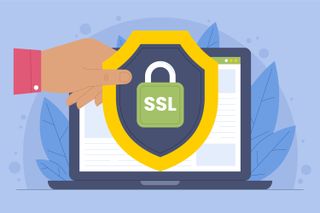As ubiquitous as SSL certificates might be in this day and age, quantifying their specific boons isn't always easy. An ideal SSL certificate doesn't really make itself known, after all, and an SSL certificate's backend behaviour could very well be a total mystery from the layman's perspective.
One might be quick to wonder, instead, if they would even need an SSL certificate in the first place. Getting an SSL certificate installed - one that's been produced and licensed by a verified, trustworthy Certificate Authority - costs money and time, after all, and those resources are often in short supply.
While there are many reasons why one would want to invest in their website security and establish a secure connection to protect sensitive information on the given domain, odds are that they're not readily apparent to many people. To that end, this article will go into some detail on the specifics behind a standard SSL certificate. It will also explain why most websites need an SSL certificate, and what the actual effects of using an SSL certificate are in the first place.

6 Key Reasons to Get SSL Certificates
To best illustrate why SSL certificates are a crucial tool in a modern webmaster's toolbox, this article will identify six crucial points of interest. Sure enough, some of them do indeed sound rather oblique and unconcrete, but we aim to explain what makes them crucial for the continued (and successful!) operation of your website.
TLS is no joke even when considered in a vacuum, and all the disparate boons it comes with by default could very well make your own website all the more profitable over a longer period of time.
SSL stands for 'Secure Sockets Layer,' which is a descriptor used for the earliest iterations of the modern SSL/TLS technology. Secure Sockets Layer eventually grew to become 'Transport Layer Security,' as we've previously explained in a separate article, and this is the technology that every modern SSL certificate uses in this day and age. This is important because it illustrates that the contemporary SSL certificates aren't an old, outdated design, but a modern and multi-purpose system that far outweighs its price.
SSL certification is, indeed, useful in more ways than one, and keeping your site secure is just a part of the equation. In the following sections, we'll explain why that is the case in ample detail.
#1: Identity Affirmation
The very concept of a digital certificate was initially envisioned as a way of website authentication. Or, rather, an SSL certificate was a purpose-built solution to the problem of knowing who's who on the Internet.
By establishing a number of trusted third parties - Certificate Authority companies - the burgeoning Internet infrastructure could finally support its own need for identity verification. SSL certification allowed users from across the world to trust that a given website truly is the sort of authority it pretends to be, which in turn opened up unprecedented e-commerce growth and for a variety of major e-commerce sites to spring up, for example.
Without an SSL certificate, there very well could be two websites competing for the same domain traffic: one of them legitimate and valid, and the other a malicious imposter, the only purpose of which is to trick visitors into believing it is legitimate, instead.
If the domain looks the part, it very well could funnel all the traffic from its intended recipient and steal private information or, even more concerningly, various financial information. By verifying that, say, your banking site is the real deal, SSL certificates side-step this problem almost entirely.
#2: Data Encryption & Protection
As important as keeping data from getting stolen by imposters and copycats might be, encryption and protection of an already verified domain is equally crucial. A modern SSL certificate protects any and all server-client communications by applying varying levels of encryption to the information that gets passed through.
In effect, the way an SSL certificate keeps you from getting your data stolen is to make it effectively indecipherable to anyone who doesn't have access to a proper key pair. A topic in its own right, this technique practically ensures that only the intended recipient can ever learn anything concrete about the data in question.
SSL certification is not perfect, however. It's still within reason that a particularly capable MITM (Man-in-the-middle) attack could compromise the given data. Or, perhaps, that a specific aspect of a given security system might get leaked through a clever bit of social engineering. The tech itself, however, is exceedingly reliable.
#3: Better SEO
Over the past couple of decades, the use of Google's search engine as the way to browse Internet has skyrocketed the importance of SEO, too. Search Engine Optimization is, quite simply, a tendency to improve one's content and its formatting to facilitate improved lookup ranking and organically bolster a website's performance.
Its importance cannot be overstated in this day and age, with one domain needing to battle it out with innumerable competitors just to stay on the crucial first page of lookup results.
What some may not know, however, is that insecure sites do indeed perform worse than the ones with SSL certificates in place. Namely, Google incurs a lookup malus on contemporary HTTP sites due to them not being fully secured.
Therefore, simply by purchasing an SSL certificate of any sort, be it an EV SSL or a simple domain validation product, you're improving your website performance by a measurable margin. Since your web server is supposed to be as effective as possible in driving traffic towards it, it goes without saying that such a simple way of improving its SEO shouldn't be left on the table.
#4: PCI Compliance
PCI (Payment Card Industry) compliance is an absolutely crucial requisite for any given ecommerce site. Quite simply, without full and proper PCI assent, the given website cannot support card payments of any sort, making it impossible to conduct any customer-facing business on the given domain.
There's a grand total of 12 primary PCI DSS domain requirements in place, and the implementation of a proper SSL certificate from a trusted third party is a must-have. Thankfully, all of the Certificate Authority companies available via SSLTrust come with full and proper PCI compliance by default, which means that the webmaster does not need to worry about this particular part of the equation.
#5: Bolstered Trustworthiness
One of the main constants with each and every SSL certificate on the market, whether they're Wildcard SSL certificates, Multi-Domain SSL certificates, or any other permutation of the core concept of an SSL/TLS product, is that they all readily improve a given domain's trustworthiness.
Depending on how involved a given certificate might be, it could come with a whole slew of trustworthiness signals. These include (but are not limited to):
- site seal graphics
- enabled HTTPS
- green address bar
- green padlock icon in the URL bar
- organization details available to the visitor (should they look for it)
Naturally, not all of the above is available via every single SSL/TLS product, but even just having HTTPS and a CA's official site seal in place could do wonders for your destination server.
As soon as your visitors see the available trustworthiness signals - as provided by a trusted third party such as DigiCert, Comodo, or GeoTrust - they're more likely to turn into paying customers. Combined with improved SEO, odds are good that your domain will see substantially improved conversion rates over a long period of time, should you invest in an SSL certificate.
#6: Improved Browsing Experience
The easier it is for a visitor to convert into a paying customer, the more likely this is to happen. Obviously, it should be everyone's goal to streamline and optimize a website's domain flow as much as humanly possible to facilitate this conversion.
While all of the features described above matter a great deal in helping bring this to fruition, one specific interaction between an SSL certificate (or a lack thereof) and modern browser applications often gets overlooked during these discussions.
Specifically, if there's no SSL/TLS product in place on a given website, any up-to-date web browser will outright alert the visitor of that fact with a huge and disruptive pop-up. This security feature might not sound like a huge deal, but it immediately interrupts your domain flow and is bound to make visitors leery of the domain's trustworthiness in the first place.
By investing in an SSL certificate, however, this issue is immediately resolved.
Do These Features Really Matter That Much?
Indeed, they do. It's all too easy to be cavalier about web security until something bad happens, after all. Whether one falls victim to phishing scams or suffers from a MITM attack, it matters precious little: when data is stolen and/or compromised, the going gets tough.
As we've explained above, however, protecting your sensitive data isn't where the buck stops with SSL certificates. Even the simplest SSL certificate will do the following:
- enable HTTPS
- boost your search engine ranking
- open up the attached Secure Site Seal
- secure data (with varying levels of encryption)
- push your domain through a standardized validation process
Each of these items has inherent value. Whether you're looking to protect payment information, keep your site visitors safe, or simply to enact a solid security protocol across your online services, SSL certificates are the be-all-end-all in this regard - for the time being.
Does Everyone Need An SSL Certificate, Though?
From a realist perspective, there may well be a web domain that's so unimportant as to warrant no SSL certificate implementation. However, from a practical perspective - which is the one anyone ought to be concerned about - there's absolutely no excuse not to invest in a proper SSL certificate.
The boons are too numerous and useful to ignore, and HTTPS websites simply perform better when looking into any reasonable metric. Keeping your web server up and running with no reasonable protection in place is not a smart option, as it were.
It is worth pointing out, however, that the likes of Extended Validation (EV SSL certificate products) can put off value-minded customers. Namely, an EV SSL certificate is considerably more expensive and complicated than a baseline single-domain SSL certificate, for example, and if a webmaster comes to believe they need such a solution for their domain, they could very well get disheartened.
That being what it is, odds are that they do not need Extended Validation in the first place, let alone a fully fledged EV SSL certificate. Even modern Wildcard SSL certificates and Multi-Domain SSL certificates can be found at remarkably competitive pricing: especially here at SSLTrust.
In Closing
We believe this article adequately illustrates the appeal of a baseline SSL certificate. From identity validation, across optimization for search engines, and all the way to protection of sensitive information, SSL certificate products have been optimized to do all manner of incredibly useful tasks. Tasks that are - of course- not readily apparent from a layperson's perspective.
It's a delightfully simple equation, in the end: not using an SSL certificate is more costly than using one. By subscribing to an SSL service, you're getting full support for all relevant web browsers, protection for website owners (i. e. you) and for website visitors, a boost to the affected domain's search engine ranking, and sensitive data encryption.
By its very nature, the SSL certificate category of products is remarkably scalable and flexible. An e-commerce website will have specific security needs (such as handling financial data, online payments, etc.) that a blog website owner would have no need for. The beauty of it, then, is that there's a perfect SSL certificate for every use case.
Discussions and Comments
Click here to view and join in on any discussions and comments on this article.


